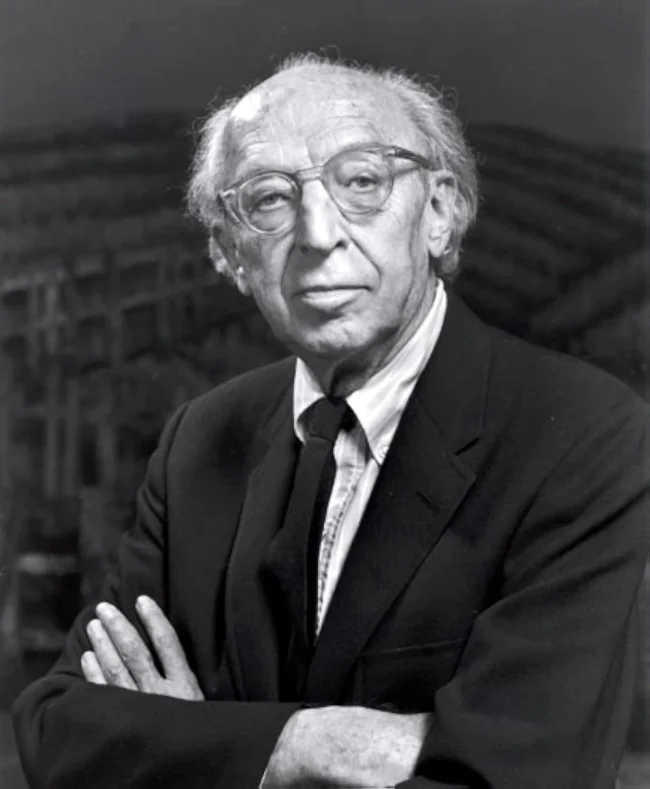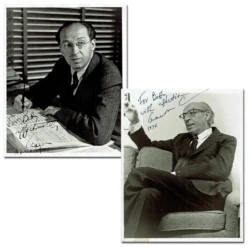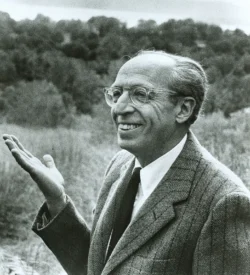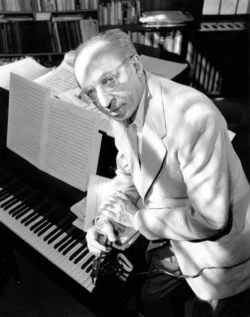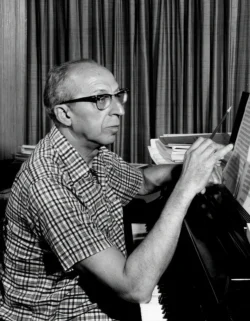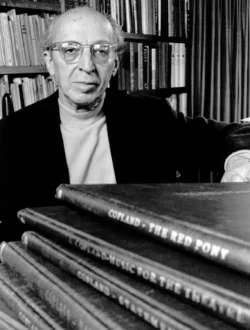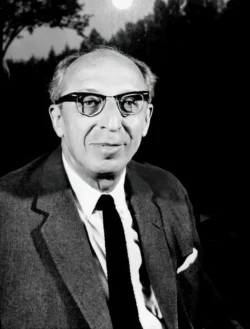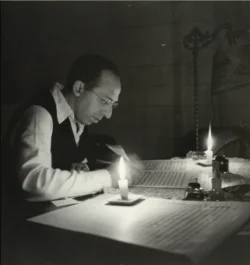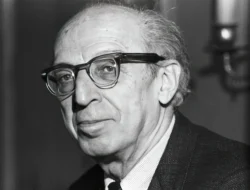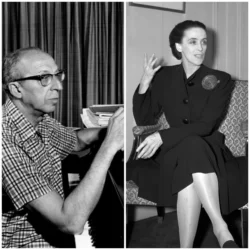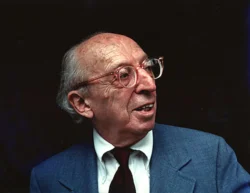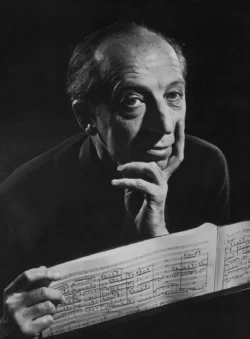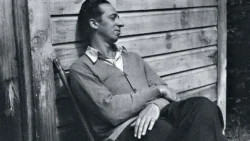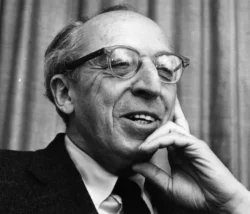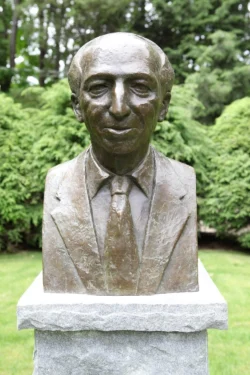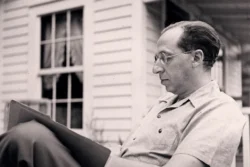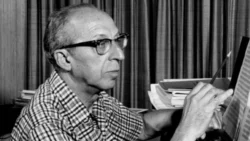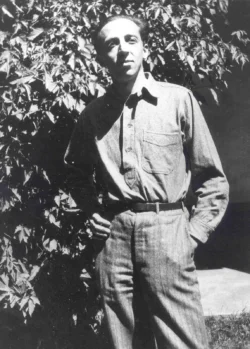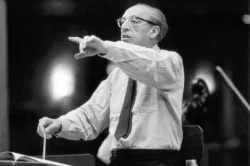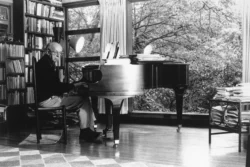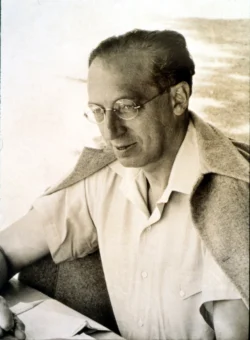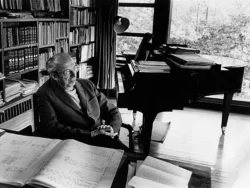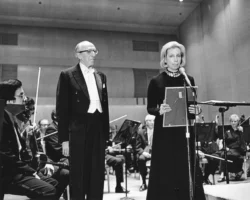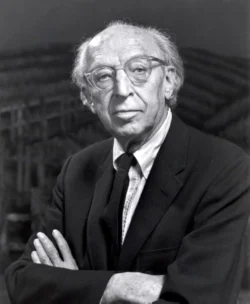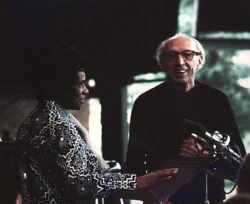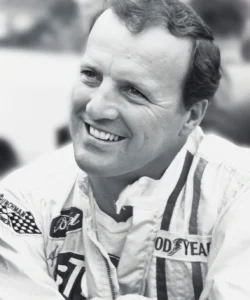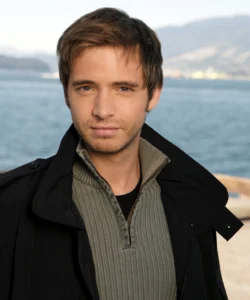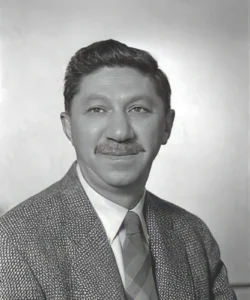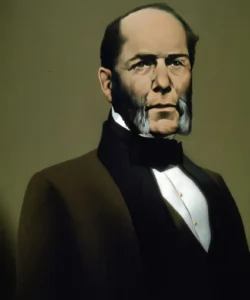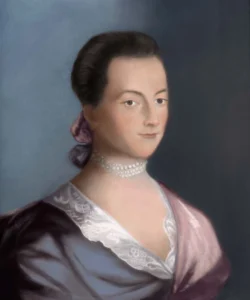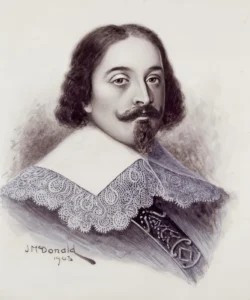Name: Aaron Copland
Introduction: Aaron Copland was an American composer, conductor, and teacher. Widely known as “the Dean of American Composers,” he is celebrated for creating a distinctive musical style that captured the essence of American identity, particularly through his use of folk themes and open, expansive sounds. His works are iconic representations of the American spirit.
Date of birth: November 14, 1900
Died: December 2, 1990 (aged 90), in North Tarrytown (now Sleepy Hollow), New York, U.S.
Height: Information not widely available.
Place of birth: Brooklyn, New York, U.S.
Family:
- Parents’ names: Harris Morris Copland (father) and Sarah (née Mittenthal) Copland (mother). Both were Russian-Jewish immigrants. His family’s original surname was Kaplan, which they Anglicized to Copland upon arriving in the U.S.
- Siblings: He was the youngest of five children. He had four older siblings: Fannie, Ralph, Leon, and Laurine. His sister Laurine gave him his first piano lessons.
- Spouse: He never married.
- Children: None.
- Relatives: His parents and siblings.
Profession: Composer, conductor, teacher, writer.
Nationality: American
Religion: He was born into a Conservative Jewish immigrant family and celebrated his bar mitzvah. While he had encounters with organized religious thought that influenced some early compositions, he remained agnostic in his personal beliefs. He was close with Zionism during the Popular Front movement.
College or university attended:
- Boys’ High School in Brooklyn (graduated 1918)
- Studied piano with Leopold Wolfsohn and composition with Rubin Goldmark.
- American Conservatory in Fontainebleau, France (summer 1921)
- Studied composition and harmony with Nadia Boulanger in Paris (1921–1924), who became a profound influence on his musical outlook.
Biography and What Famous For:
Aaron Copland’s musical journey began early, learning piano from his older sister and later taking formal lessons. By age 15, he decided to become a composer. After high school, he traveled to France, where he became a pioneering American student of the renowned music teacher Nadia Boulanger. Her guidance helped shape his distinct approach to composition.
Upon returning to the United States, Copland initially experimented with jazz rhythms in works like “Music for the Theater” (1925) and “Piano Concerto” (1926). He also explored a more abstract, “lean” style influenced by Igor Stravinsky, evident in his “Piano Variations” (1930).
However, Copland is overwhelmingly most famous for his “Americanist” works from the mid-1930s onwards, where he consciously aimed to create music that would resonate with a broader American public and evoke a sense of national identity. This period produced his most beloved and iconic compositions:
- Ballets based on American folk material:
- “Billy the Kid” (1938): A ballet exploring the legend of the American outlaw.
- “Rodeo” (1942): Including the famous “Hoedown” section, which evokes cowboy life.
- “Appalachian Spring” (1944): Commissioned by dancer Martha Graham, this ballet about a pioneer wedding in rural America earned him the Pulitzer Prize for Music in 1945 and is considered his masterpiece.
- “Fanfare for the Common Man” (1942): A powerful and enduring piece, originally written for brass and percussion, that has become a symbol of American resilience and democratic ideals.
- “A Lincoln Portrait” (1942): A majestic orchestral work for speaker and orchestra, using excerpts from Abraham Lincoln’s speeches.
- Film Scores: He also composed notable film scores, including for “Of Mice and Men” (1939), “Our Town” (1940), and “The Heiress” (1949), for which he won an Academy Award for Best Musical Score.
- “El Salón México” (1936): An orchestral piece drawing on Mexican folk melodies.
- Third Symphony (1946): A grand work often seen as a summation of his American style.
Beyond composing, Copland was also a significant figure in American music as a teacher, writer (authoring books like “What to Listen for in Music”), organizer of musical events, and a sought-after conductor of his own and others’ works. In his later years, he experimented with serial techniques (12-tone), as seen in “Piano Fantasy” (1957) and “Connotations” (1962).
Copland received numerous awards throughout his career, including the Pulitzer Prize, an Academy Award, a Grammy Award, the Presidential Medal of Freedom (1964), and the Kennedy Center Honors (1979). He died in 1990 at the age of 90, leaving behind a legacy as one of the most influential and beloved American composers of the 20th century.
Have participated:
Major Compositions (Selected):
- Music for the Theater (1925)
- Piano Concerto (1926)
- Piano Variations (1930)
- Short Symphony (1933)
- Statements for Orchestra (1933–35)
- El Salón México (1936)
- The Second Hurricane (play opera, 1937)
- An Outdoor Overture (1938)
- Billy the Kid (ballet, 1938)
- Of Mice and Men (film score, 1939)
- Our Town (film score, 1940)
- Fanfare for the Common Man (1942)
- A Lincoln Portrait (1942)
- Rodeo (ballet, 1942)
- Appalachian Spring (ballet, 1944)
- Letter from Home (1944)
- Third Symphony (1946)
- The Heiress (film score, 1949)
- Twelve Poems of Emily Dickinson (voice and piano, 1950)
- Old American Songs (folk song arrangements, 1950, 1952)
- The Tender Land (opera, 1954)
- Piano Fantasy (1957)
- Nonet (1960)
- Connotations (1962)
- Inscape (1967)
Books:
- What to Listen for in Music (1939)
- Music and Imagination (1952)
- Copland on Music (1960)
- The New Music, 1900–60 (1968)
- Copland: 1900 Through 1942 (autobiography, Vol. 1, 1984, with Vivian Perlis)
- Copland: Since 1943 (autobiography, Vol. 2, 1989, with Vivian Perlis)
Awards and Honors (Selected):
- Guggenheim Fellowship (1925, 1926)
- Pulitzer Prize for Music (1945) – “Appalachian Spring”
- New York Music Critics’ Circle Award (1945) – “Appalachian Spring”
- Academy Award for Best Musical Score (1950) – “The Heiress”
- Fulbright Fellowship Recipient (1951)
- American Academy and Institute of Arts and Letters Gold Medal Recipient (1956)
- Grammy Award for Best Contemporary Classical Composition (1960)
- Presidential Medal of Freedom (1964)
- Kennedy Center Honors (1979)
- Grammy Trustees Award (1981)
- National Medal of Arts (1986)
- Special Congressional Gold Medal (1987)
- Grammy Hall of Fame Induction (posthumous) – “Appalachian Spring,” “Symphony No. 3,” “Fanfare for the Common Man”
Aaron Copland Photos:
